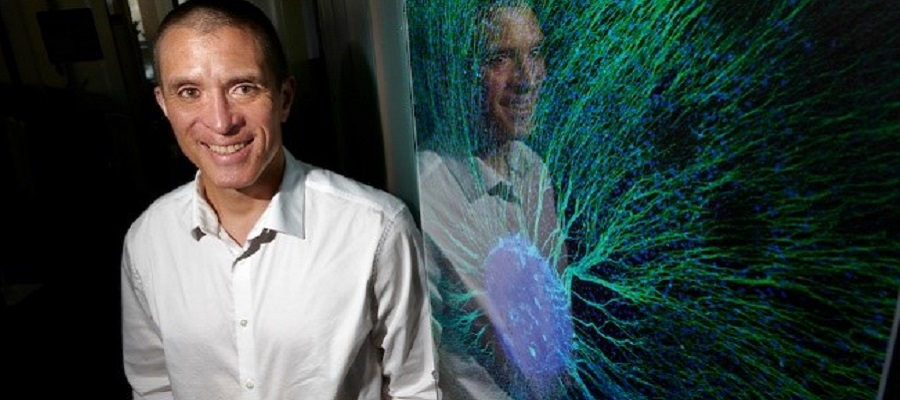
CRM Group Leader Tilo Kunath has been promoted to Personal Chair. This title is awarded to University staff who have sustained achievement of the highest distinction and have received recognition in an international context.
Professor Kunath set up his own research group in 2007 with the aim of making crucial advancements in the fight against Parkinson’s disease. He is also the Director of International Engagement at the University, and a member of SynthSys, home to the UK’s Centre for Mammalian Synthetic Biology. He successfully created the first human induced pluripotent stem (iPS) cells for Parkinson's in Scotland and published a ground-breaking paper on how producing iPS cells from Parkinson’s patients unlocks the next phase of research into the disease.
With an active interest in the Parkinson’s community Professor Kunath co-founded the Edinburgh Research Interest Group (ERIG) in 2010, a group organised so that people with an interest in Parkinson’s could meet, work together and further the cause of Parkinson’s research. He is also a founding member of the award winning ‘NoseToDiagnose’ multidisciplinary team who are currently developing a novel approach to Parkinson’s diagnosis using a skin swab. He was awarded the Tom Isaacs Award by Cure Parkinson's in 2019, an award given to a researcher for the greatest impact on the lives of people living with Parkinson’s (PD) and involving people in a participatory way.
I am delighted that Professor Kunath has been rightly recognised with this appointment. His excellent research in the field of stem cells has been found to have important implications for diseases such as Parkinson's where new therapeutic approaches are needed. He is a great example to the next generation of scientists and I am proud to have him as a member of the Centre for Regenerative Medicine.
Professor Stuart Forbes
CRM Director
I am very honoured to receive this Chair, and would like to sincerely thank all my mentors and colleagues in School of Biological Sciences, Centre for Regenerative Medicine, and the Parkinson’s community who have supported me and my research at the University.
Professor Tilo Kunath
Group Leader and Chair of Regenerative Neurobiology
Fighting Parkinson’s
Parkinson’s disease is the fastest-growing neurological condition in the world, and currently, there is no cure. 1 in 37 people alive today in the UK will be diagnosed with Parkinson’s in their lifetime. Research from 2020 suggests that there are an estimated 145,000 people living with Parkinson’s in the UK. With the population growth and ageing, it is estimated that this will grow to 172,000 by 2030. It is a progressive disorder that is caused by degeneration of nerve cells, these cells die or become impaired, losing the ability to produce an important chemical; dopamine. The absence of dopamine makes it hard for the brain to coordinate muscle movements, causing motor symptoms, such as tremors.
Key advancements offer new hope
The creation of the first human iPS cells in Scotland has the potential to significantly affect the development of next-generation cell-based therapies and unlock the next phase of research into the disease. This would have clinical implications as they could be considered as possible donor cells in future Parkinson’s trials.
Clinical studies on cell replacement therapy have been trialled in the past and have shown that although some patients saw their motor symptoms improve, others displayed transplant-induced dyskinesias – abnormal, uncontrolled and involuntary movement. The replacement cells also acquired the hallmarks of Parkinson’s, known as Lewy bodies.
Professor Kunath and his team have used a gene-editing tool known as CRISPR-Cas9. This technique allows scientists to edit parts of the genome by removing, adding or altering specific sections of the DNA sequence. These new laboratory-generated midbrain dopaminergic (mDA) cells did not develop signs of the disease, Lewy bodies, unlike those that were not gene-edited.
Transplantation of dopamine-producing neurons has proved useful in disease management because it can reinnervate Parkinson’s affected brain regions, restore dopamine levels and provide symptom relief. These advances could be most beneficial in young-onset Parkinson’s and younger patients.
Find out more
Read more about Professor Tilo Kunath
Explore the Kunath Research Lab
Find out more about the Centre for Synthetic and Systems Biology (SynthSys)

